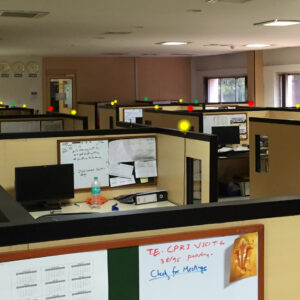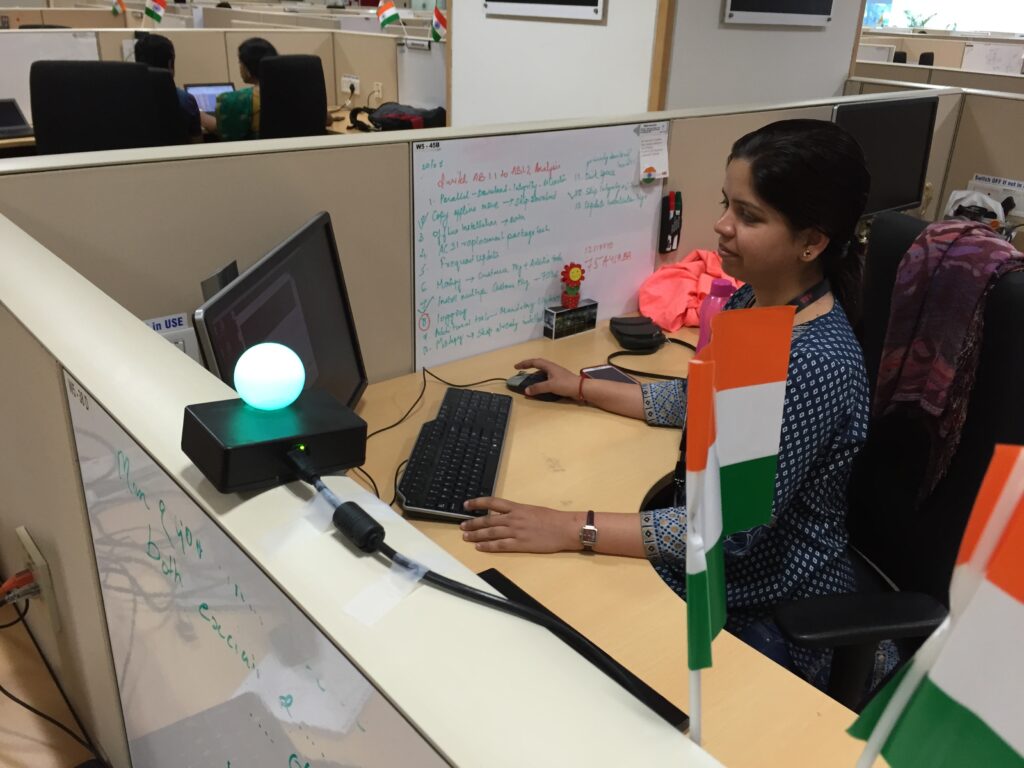André N. Meyer, Dr.
Senior Research Assistant
Bio
I am a postdoc, working with Prof. Thomas Fritz. My research interests lie in developers’ productivity and work, and in creating tools that foster productivity at work by using persuasive technologies such as self-monitoring and goal-setting.
In my research, I’ve built a tool, PersonalAnalytics, that increases developers’ awareness about work and productivity and helps them to come up with productive behavior changes. In collaboration with ABB, we’ve built the FlowLight, a traffic-light like system that successfully reduces interruptions at the workplace that happen at inopportune moments. You may find all my publications here and supplementary material and links to our work in the media here.
Previously, I’ve interned with Microsoft Research (Redmond, US) twice and was working at the University of British Columbia (Vancouver, Canada) as a visiting researcher. I am a co-founder (and was previously CTO) of Okomo, a swiss-based SaaS startup which empowers companies to have personal interactions with their customers on online-channels. For two years, I’ve worked at a health-tech AI-startup as head of regulatory affairs and quality management, developing all the relevant (development and quality) processes.
Find out more about my work on my blog, my Google Scholar-profile, and LinkedIn.
Publications
- ICSE’24 On the Helpfulness of Answering Developer Questions on Discord with Similar Conversations and Posts from the Past. Alexander Lill, André N. Meyer, Thomas Fritz.
- CSCW’23 Cultivating a Team Mindset about Productivity with a Nudge: A Field Study in Hybrid Development Teams. Thomas Fritz, Alexander Lill, André N. Meyer, Gail C. Murphy, Lauren Howe.
- ICSE’23 Semi-Automatic, Inline and Collaborative Web Page Code Curations. Roy Rutishauser, André Meyer, Reid Holmes, Thomas Fritz. Conference Paper.
- EURA’22 Performance of a deep convolutional neural network for MRI-based vertebral body measurements and insufficiency fracture detection. Christoph Germann, André Meyer, Matthias Staib, Reto Suter, Benjamin Fritz. Journal Paper.
- TSE’20 Detecting Developers’ Task Switches and Types. André Meyer, Chris Satterfield, Manuela Züger, Katja Kevic, Gail Murphy, Thomas Zimmermann, and Thomas Fritz. Journal Paper.
- CHI’20 Supporting Software Developers’ Focused Work on Window-Based Desktops. Jan Pilzer, Raphael Rosenast. André Meyer. Elaine Huang. Thomas Fritz. Conference Paper. Presentation.
- Dissertation Fostering Software Developer Productivity through Awareness Increase and Goal-Setting. André Meyer. Dissertation.
- TSE’19-2 Enabling Good Work Habits in Software Developers through Reflective Goal-Setting. André Meyer, Gail Murphy, Thomas Zimmermann, Thomas Fritz. Journal Paper. Presentation.
- Springer’19 Fitbit for Developers: Self-Monitoring at Work. André Meyer, Thomas Fritz, Thomas Zimmermann. Book Chapter (Open Access).
- Springer’19 Developers’ Diverging Perceptions of Productivity. André Meyer, Thomas Fritz, Thomas Zimmermann. Book Chapter (Open Access).
- Springer’19 Reducing Interruptions at Work with FlowLight. Manuela Züger, André Meyer, Thomas Fritz, David Shepherd. Book Chapter (Open Access).
- TSE’19-1 Today was a Good Day: The Daily Life of Software Developers. André Meyer, Earl Barr, Christian Bird. Thomas Zimmermann. Journal Paper.
- CSCW’18 Design Recommendations for Self-Monitoring in the Workplace: Studies in Software Development. André Meyer, Gail Murphy, Thomas Zimmermann, Thomas Fritz. Conference Paper.
- ICSE’18 Fostering Software Developers’ Productivity at Work through Self-Monitoring and Goal-Setting. André Meyer. Doctoral Symposium Track.
- CHI’18 Sensing Interruptibility in the Office: A Field Study on the Use of Biometric and Computer Interaction Sensors. Manuela Züger, Sebastian Müller, André Meyer, Thomas Fritz. Conference Paper. Top 5%.
- ESEM’17 Characterizing Software Developers by Perceptions of Productivity. André Meyer, Thomas Zimmermann, Thomas Fritz. Industry Track. (Blog Post)
- TSE’17 The Work Life of Developers: Activities, Switches and Perceived Productivity. André Meyer, Gail Murphy, Thomas Zimmermann, Laura Barton, Thomas Fritz. Journal Paper. (Blog Post)
- CHI’17 Reducing Interruptions at Work: A Large-Scale Field Study of FlowLight. Manuela Züger, Christopher Corley, André Meyer, Boyang Li, Thomas Fritz, David Shepherd, Vinay Augustine, Patrick Francis, Nicholas Kraft and Will Snipes. Conference Paper. Top 5%. Covered in The Telegraph, Wall Street Journal, GeekWire, DigitalTrends, The New Yorker, and 70 more.
- FSE’14 Software Developers’ Perceptions of Productivity. André Meyer, Gail Murphy, Thomas Zimmermann, Thomas Fritz. Conference Paper. Best Paper Nominee.
Click here to find a complete list of publications.
Project Supervisions
- TaskSnap
- WorkRhythm Dashboard
- MindfulPacer
- AmbientTeams
- Emotional Awareness
- Expectation Management
- Break Scheduler
- and many more 🙂
Teaching
- 2023: Software Evolution and Developer Productivity Seminar (lead), CAS Fintech, Software Lab SoPra (support)
- 2022: Innovathon, Studium Digitale, GymInf, CAS Fintech, Software Lab SoPra (support)
- 2020 Software Lab SoPra (lead)
- 2017 Assistant: Human Aspects of Software Engineering
- 2016 Assistant: Human Aspects of Software Engineering
- 02/2015 – 07/2015 Teaching Assistant: Software Lab
- 09/2013 – 12/2013 Teaching Assistant: Introduction into Programming

| Address |
University of Zurich |
| Office |
Selected Projects

FlowLight & FlowTeams – Fostering Productive Work in Hybrid Workplaces
In today’s collaborative work environments, knowledge workers experience frequent interruptions from their co-workers, either in-person at the office or through online channels. We previously developed a research prototype, FlowLight, which reduces 46% of interruptions at work, by visualizing users’ current focus in a physical LED light. We are now aiming to adapt the FlowLight to today’s hybrid workplace scenarios and make it available to the public, to help foster deep work.
Members: André Meyer, Thomas Fritz

Individual Productivity – Personal Analytics
Understanding software developers’ productivity, and devising approaches to allow developers to identify productive behavior changes through retrospection and self-reflection that fosters productivity and focus at work.
Members: André Meyer, Thomas Fritz

Team Productivity
Exploring the patterns and challenges in building software products, and developing strategies to improve collaboration and wellbeing in the workplace.
Members: Alexander Lill, Anastasia Ruvimova, André Meyer, Thomas Fritz

Supporting Developer Workflows
One of the biggest impediments to software developer’s productivity in today’s (hybrid) work scenarios is the high work fragmentation, with developers constantly switching between tasks, and artifacts. Our work focuses on sensing software developers’ workflows and task context, to better support the cross-application, cross-artifact and multi-tasking nature of development work.
Members: Roy Rutishauser, André Meyer, Thomas Fritz

